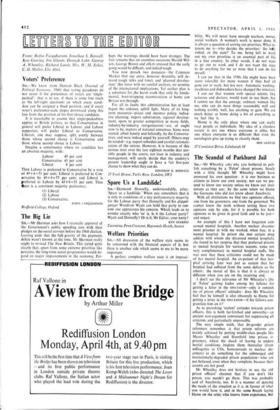Welfare Priorities
SIR,—All discussion of the welfare state seems to be concerned with the financial aspects of it, but there is another side which seems to me to be more important.
A perfect, complete welfare state is an impossi-
bility. We will never have enough teachers, nurses, social workers. A woman's work is never done. It is always a question of sorting out priorities. What in- terests me is—who decides the priorities: the mai- vidual, or the state? To me, being left to work out my own priorities is an essential part of life in a free country. In other words, I do not want to go out to work and I do not want the state to do anything for me or mine that I can do for myself.
I can see that in the 1930s life might have been more tolerable for more women if they had all gone out to work, but not now. Automatic washing- machines and dishwashers have changed the situation.
I can see that women with special talents, like actresses and doctors, would want to use them, but I cannot see that the average, ordinary woman like me, who can do most things reasonably well and nothing terribly well, has anything to gain. We are much better at home doing a bit of everything as we feel like it.
Home is the only place where one can really treat people as individuals. My idea of a classless society is not one where everyone is alike, but one where everyone is so different that even the sociologists give up trying to classify them.
57 Corniston Drive, Edinburgh 10
IRIS GLOVER


































 Previous page
Previous page